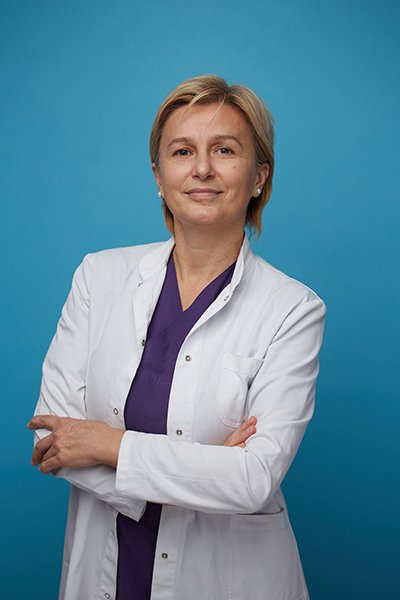Endocrinology deals with disorders of internal secretion glands as well as the illnesses that are caused by those disorders.
Diabetes and thyroid diseases, but also other conditions and diseases: hyperlipoproteinemia, or an increase in cholesterol and triglycerides, obesity and eating disorders, metabolic syndromes, diseases of the parathyroid glands, adrenal glands, pituitary gland, female and male sex hormones, bone density disorders, osteoporosis, osteopenia belong to the domain of endocrinology.

Nowdays Diabetes is listed among the most frequent endocrinology diseases with an inclination to constant growth. It is a direct consequence of modern way of living and the increase in the number of etiological factors, among which obesity, physical inactivity and stress stand out.
Vast number of patients (around 50%) don’t know or are not aware that they are suffering from diabetes, exposing themselves to serious risk of multiple complications caused by this illness.
Measurement of glycemia(OGTT, all-day profile), determination of HbA1c, insulinemia, are just some of the cardinal factors for the prevention, monitoring, and treatment of this disease, especially for the prevention of chronic complications that this disease brings with it.
Obesity, a large modern age problem, especially among the youth. By determining BMI( body mass index), as well as the number of the calories necessary for daily activities, we can determine the adequate hypocaloric diet for each individual in compliance with the physical activity.

The endocrine system (system of glands with internal secretion) includes: hypothalamus and pituitary gland, thyroid gland (thyroid), parathyroid glands (parathyroid glands), pancreas (a part of it), adrenal glands, ovaries and testicles.
Endocrinologists are the ones to thank to for discovering the cause of obesity, preventing the occurrence of the metabolic syndrome, controlling and regulating the bogy weight.
Endocrinologist is an internal medicine subspecialist that treats patients for endocrine and metabolic disorders.
Tretmani
Experienced experts at CODRA Hospital deal with prevention and treatment of:
- hypothalamus diseases
- pituitary diseases (pituitary tumors, hyperprolactinemia, growth hormone hypersecretion, hypopituitarism and diabetes insipidus)
- thyroid gland diseases (hypothyroidism, hyperthyroidism, goiters, thyroid tumors and various thyroiditis)
- diseases of the parathyroid gland (hypofunction of the parathyroid gland and hyperfunction of the parathyroid gland, i.e. primary and secondary hyperparathyroidism)
- diseases of the adrenal gland (hyperfunction of the adrenal cortex, hypofunction of the adrenal cortex and diseases of the adrenal medulla, such as pheochromocytoma)
- diseases of the sex glands – gonads (amenorrhea, polycystic ovary syndrome – PCOS, sterility, menopause, hypogonadism and gynecomastia)
- diabetes mellitus – diabetes mellitus (diabetes mellitus type I, diabetes mellitus type II, gestational diabetes and other specific forms of diabetes)
- pathological nutrition (obesity, malnutrition)
- lipid metabolism disorders (hyperlipoproteinemia).
Thyroid gland diseases take the second place, right after diabetes. The two most common disorders are increased function, hyperthyroidism and decreased function, hypothyroidism. Changes in the structure of the thyroid gland, the most common enlargement, goiter, can be associated with hyperactivity, but also with hypoactivity of the gland in second place, right after diabetes
Many diseases of the thyroid gland do not exact individual aches. Later course of the disease can be characterized as insidious, unrecognizable, up until the moment the complications are developed. The most thyroid gland disorders that are detected on time can fully be cured.

The diagnosis is established by anamnesis, objective examination, hormone analysis and color Doppler ultrasound examination.
Ultrasound determines the size of the gland, changes in the structure and vascularization of the parenchyma. Focal or localized changes (nodule or cyst) are detected and evaluated. Based on the findings, a decision is made on further treatment or follow-up.
In addition to a clinical examination by an endocrinology specialist, an ultrasound examination of the thyroid gland, abdomen (adrenal gland, pancreas) as well as complete laboratory diagnostics is available to all of our patients.
Our team of endocrinologists
In our hospital, an expert team of endocrinologists takes care of the condition of your endocrine system: pituitary gland, thyroid gland, pancreas (diabetes mellitus), adrenal gland.
In the CODRA hospital laboratory, it is possible to perform hormonal tests (T3-triiodothyronine, T4-thyroxine, fT3-free T3, fT4-free T4, TSH, Anti-TG At, Anti-TPO At, Thyroglobulin, PTH, Estradiol, FSH, LH, Prolactin, Progesterone, Testosterone, 17-OH progesterone, ACTH, Cortisol).
In CODRA hospital in addition to the examinations, we perform all types of surgeries: thyroid surgery, FNAB of thyroid nodules, pancreatic surgery, obesity treatment bariatric procedures, sleeve gastrectomy, as well as intragastric balloon.


